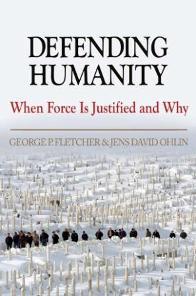Fletcher, Ohlin Offer Legal Argument For Humanitarian Intervention
Fletcher, Ohlin Outline Legal Argument For Humanitarian Intervention
DEFENDING HUMANITY: WHEN FORCE IS JUSTIFIED AND WHY
March 31 Symposium At Columbia Law School
Press contact:
Erin St. John Kelly 212-854-1787 or cell 646.284.8549
March 25, 2008 (NEW YORK) – Columbia Law School Professor George P. Fletcher and Columbia Associate-in-Law Jens David Ohlin’s new book, Defending Humanity: When Force is Justified and Why, will be the focus of a symposium March 31 at Columbia Law School.
The book, published by Oxford University Press this month, develops a legal basis for humanitarian intervention.
The book offers a new interpretation of Article 51 of the United Nations Charter and the international law of self-defense, and analyzes humanitarian intervention, aggressive war, and the doctrine of preventive war.
Fletcher (far left) and Ohlin (left) argue in the book that Article 51's provision on self-defense should be interpreted to include the “legitimate defense” of third parties under attack. The authors use this novel interpretation as a legal basis for justifying humanitarian intervention.
WHAT: “Defending Humanity: When Force is Justified and Why” a symposium.
WHEN: Monday, March 31 at 5 P.M.
WHERE: Columbia Law School, Jerome Greene Hall, Room 103, Amsterdam at West 116 St.; Via subway: #1 train to 116 Street (Broadway)/Columbia University.
SPEAKERS: Columbia Law School professors George P. Fletcher, Lori Damrosch and Matthew Waxman, Columbia Associate-in-Law Jens David Ohlin, Jeff McMahan of Rutgers University and Harmen van der Wilt of the University of Amsterdam.
Media interested in covering the event should contact Erin Kelly at 212-854-1787 or [email protected]
Columbia Law School, founded in 1858, stands at the forefront of legal education and of the law in a global society. Columbia Law School joins traditional strengths in international and comparative law, constitutional law, administrative law, business law and human rights law with pioneering work in the areas of intellectual property, digital technology, sexuality and gender, and criminal law.


